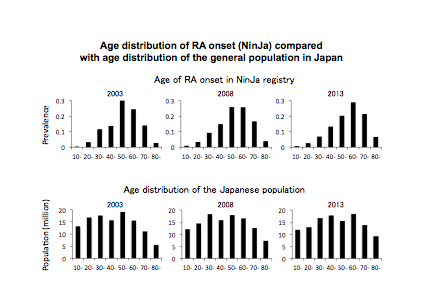Session Information
Date: Monday, November 9, 2015
Session Type: ACR Poster Session B
Session Time: 9:00AM-11:00AM
Background/Purpose: Previous studies from Western countries have
demonstrated that the incidence of rheumatoid arthritis (RA) increases with age
and the age of RA onset was about 59 years. However, in Japan, Imanka et al demonstrated that it increased from 37.5 years
of age in the period of from 1960 to 1965 to 46.9 years of age in the period of
from 1985 to 1990. Japan has faced a demographic change with a rapidly aging
population in recent decades. In our experience in daily clinical practice over
the past decade, we felt that we have encountered more patients who developed
RA late in life than previously. In the present study, we aimed to determine
whether there was a shift in the age of RA onset toward elderly onset based on
a nationwide cohort database (National Database of Rheumatic Diseases by iR-net in Japan, NinJa) between
2003 and 2013.
Methods: We analyzed the data of RA patients who were newly
registered in the NinJa database as early RA (disease
duration of less than 2 years) in 2003, 2008 and 2013. The numbers of patients
who developed RA in 2002–2003, 2007–2008 and 2012–2013 were
536, 812 and 1,864, respectively. The age composition of the Japanese
population in the corresponding periods was obtained from the database of the
Ministry of Internal Affairs and Communications. Student’s t-test was used to
compare the average ages.
Results: The average age of RA onset increased significantly over the
past decade from 55.7 years in 2003 to 57.0 years and 59.9 years in 2008 and
2013, respectively. Regarding the distribution of the age of RA onset, the peak
age shifted from the 50s in 2003 to the 60s in 2013 (Figure). There was no
difference in the age of RA onset between male and female RA patients. It
should also be noted that the prevalence of RA was disproportionately higher in
persons in their 50s in 2003, which included the so-called first baby boomers
who were born after the world war, compared with persons in their 30s and 40s,
even with consideration of the shift in age distribution of the general
population.
Conclusion: We have clearly demonstrated
that the age of RA onset has significantly increased over the last decade in
Japan. This may be attributed to the increase in the aging population, as a
birth cohort effect. However, the smoking rate is higher among the first baby
boomers than among persons of the following generations. Thus, in addition to
the birth cohort effect, alteration of environmental factors, such as cigarette
smoking, may contribute to the shift of age of RA onset in Japan.
To cite this abstract in AMA style:
Kimura E, Sawada T, Tahara K, Hayashi H, Tago M, Mori H, Matsui T, Nishino J, Tohma S. Shift of Rheumatoid Arthritis Onset Toward Old Age in Japan Based on a Nationwide Cohort Database [abstract]. Arthritis Rheumatol. 2015; 67 (suppl 10). https://acrabstracts.org/abstract/shift-of-rheumatoid-arthritis-onset-toward-old-age-in-japan-based-on-a-nationwide-cohort-database/. Accessed .« Back to 2015 ACR/ARHP Annual Meeting
ACR Meeting Abstracts - https://acrabstracts.org/abstract/shift-of-rheumatoid-arthritis-onset-toward-old-age-in-japan-based-on-a-nationwide-cohort-database/

